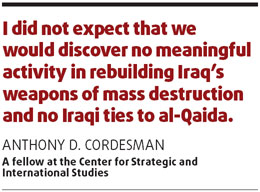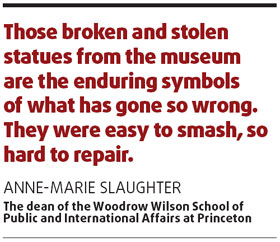Reflections on the Iraq invasion of March, 2003
(China Daily)
Updated: 2008-03-19 07:31
Updated: 2008-03-19 07:31
To mark tomorrow's fifth anniversary of the invasion of Iraq, some United States experts on military and foreign affairs comment on the war, reflecting their own attitudes.
Anthony D. Cordesman
A fellow at the Center for Strategic and International Studies
In fairness to the Bush administration, I did not expect that we would discover no meaningful activity in rebuilding Iraq's weapons of mass destruction and no Iraqi ties to al-Qaida.
In balance, however, the most serious surprise was that what appeared to be the American A-Team in national security ignored years of planning and months of interagency activity before the war, and the US had no meaningful plan for stability operations and nation building after the defeat of Saddam Hussein's armed forces.
It was even more of a surprise to watch the Bush administration fail, from 2003 to 2006, to come to grips with creating effective counter-insurgency programs, focused aid and development efforts, political accommodation and effective Iraqi forces.
Anne-Marie Slaughter
The dean of the Woodrow Wilson School of Public and International Affairs at Princeton
In April 2003, just after US troops secured Baghdad, some people looted the Iraqi national museum. American soldiers nearby made no effort to stop them, much less provide a guard. We either did not have enough soldiers to protect the museum, or we did not care enough to try.

This failure was simply a "matter of priorities", according to General Richard Myers, chairman of the Joint Chiefs of Staff. Then Defense Secretary Donald Rumsfeld thought it was a "stretch" to attribute the theft and destruction of priceless Mesopotamian artifacts to "any defect in the war plan".
Our government knew how to destroy but not how to build. We dismantled Saddam Hussein's bureaucracy and disbanded his army, but we did so with absolutely no understanding of even how to build a stable, rights-regarding government with broad popular support.
Such a government requires a prosperous economy, a secure society, and sufficient cultural unity to allow everyday interaction among different ethnic groups in workplaces, schools, hospitals, the army and the police.
Americans are still living with the aftermath of this ignorance, and we will be for decades to come. In 2003 and 2004, experts debated whether it would take one year or three to rebuild Iraq. Now we debate whether it will take 10 to 15 years or whether it can be done at all.
Those broken and stolen statues from the museum are the enduring symbols of what has gone so wrong. They were easy to smash, so hard to repair.
L. Paul Bremer III
Former presidential envoy to Iraq
Fifteen months before the 9/11 attacks, the bipartisan National Commission on Terrorism, on which I served as chairman, reported to the president and the American people that we faced a new and terrible threat: the nexus between states that supported terrorism and killers who wanted to murder Americans by the thousands and were prepared to die doing it.
For decades, US administrations from both parties had designated Saddam Hussein's Iraq a terrorist state.
After arriving in the country, I saw that the US government was not adequately prepared to deal with the growing security threats. Looting raged unchecked in major cities. By late 2003, as the insurgency and terrorism grew, it became clear that the coalition also lacked an effective counterinsurgency strategy.
Prewar planning provided for fewer than half the number of troops that independent studies suggested would be needed in Iraq, and we did not have a plan to provide the most basic function of any government - security for the population.
I should have pushed sooner for a more effective military strategy.
Richard Perle
An assistant secretary of defense in the Reagan administration and a fellow at the American Enterprise Institute
After defeating the Taliban in Afghanistan, the Bush administration turned its attention to the risk that Saddam Hussein's Iraq was thought to pose to a nation still reeling from the attacks of 9/11.
I think the right decision was made, and Baghdad fell in 21 days.

Then the trouble began. Rather than turn Iraq over to Iraqis to begin the daunting process of nation building, a group including then Secretary of State Colin Powell; then national security adviser, Condoleezza Rice; and then director of central intelligence, George Tenet - with President Bush's approval - reversed a plan to do that.
Instead, we blundered into an ill-conceived occupation that would facilitate a deadly insurgency from which we, and the Iraqis, are only now emerging. With misplaced confidence that we knew better than the Iraqis, we sent an American to govern Iraq.
L. Paul Bremer, the presidential envoy to Iraq, underestimated the task, but did his best to make a foolish policy work. I had badly underestimated the administration's capacity to mess things up.
Kenneth M. Pollack
A former director of Persian Gulf affairs at the National Security Council and a fellow at the Brookings Institution
What matters most now is not how we entered Iraq, but how we leave it.
What I most wish I had understood before the invasion was the reckless arrogance of the Bush administration. I had inklings of it to be sure, and warned of the inadequacy of some of what I saw. But I did not realize that as skillfully, cautiously and patiently as the George H. W. Bush administration had handled its Gulf War, how clumsy, careless and rash George W. Bush's administration would treat its own.
Paul D. Eaton
A retired Army major general who was in charge of training the Iraqi military from 2003 to 2004
My greatest surprise was the failure on the part of Congress to assert itself before the executive branch. That failure assured continued problems for the military in the face of a secretary of defense who proved incompetent at fighting war.
Had Congress defended the welfare of our armed forces by challenging the concentration of power in the hands of the president, the vice-president and the secretary of defense, our army and marine corps would not be in the difficult position we find them in today.
The Republican-dominated Congress failed us by refusing to hold the necessary hearings and investigations the army desperately needed.
Without hearings, the Army could not advance its case for increasing the number of troops and rearming the force. The result is an army and marine corps on the ropes, acres and acres of broken equipment, and tour lengths of 15 months because we have too few troops for the tasks at hand.
The New York Times Syndicate
(China Daily 03/19/2008 page10)
|
|
|
|